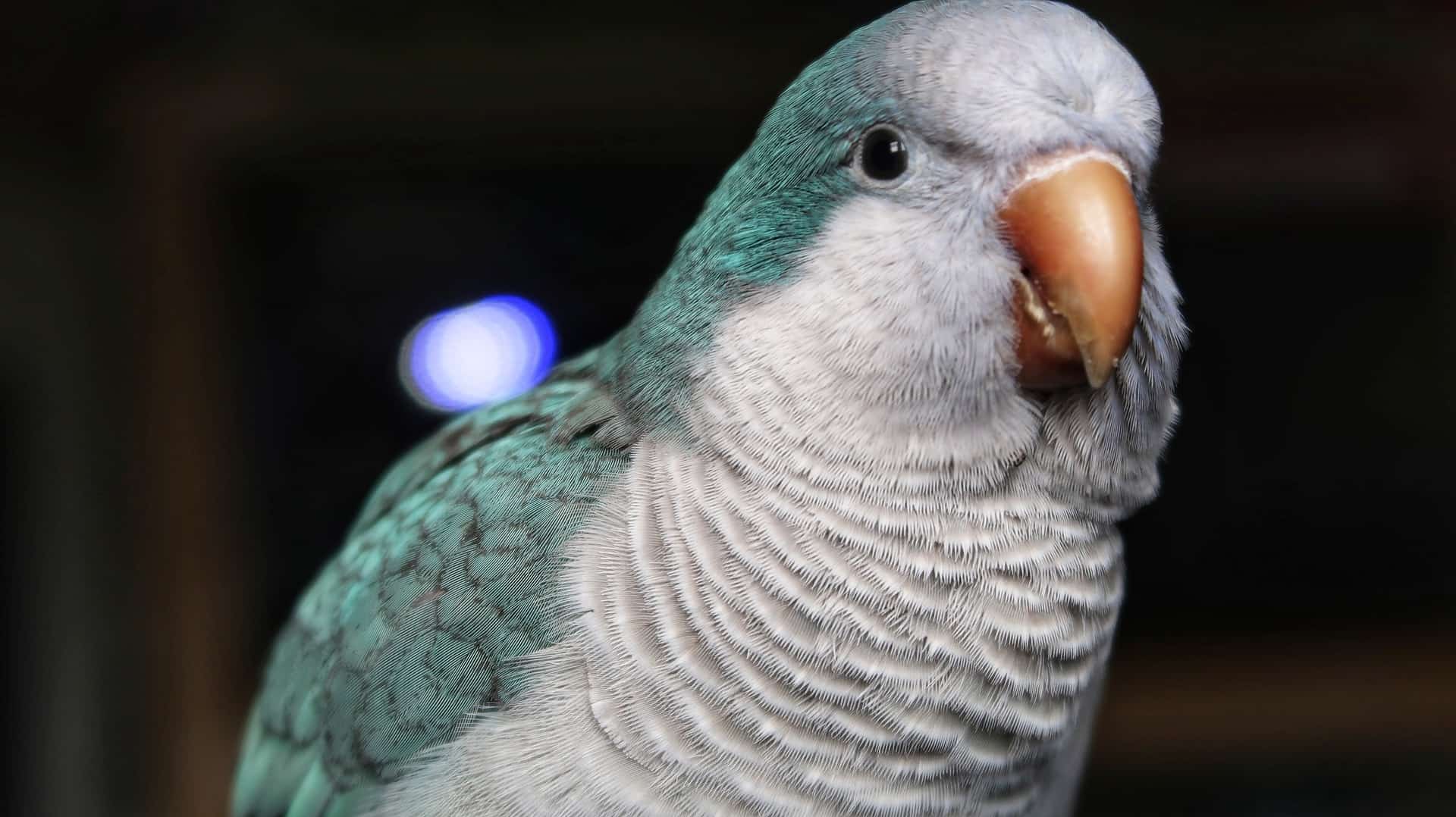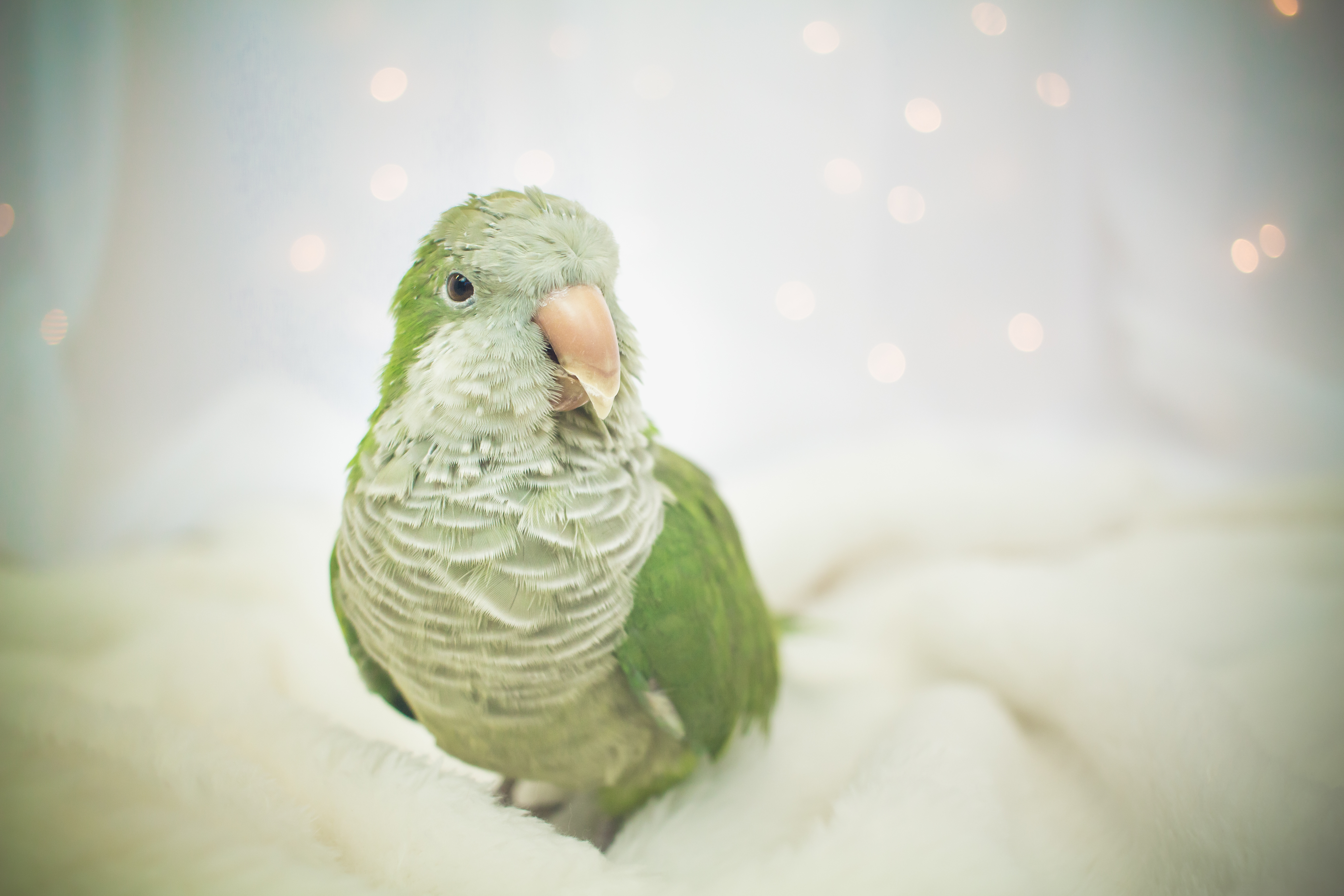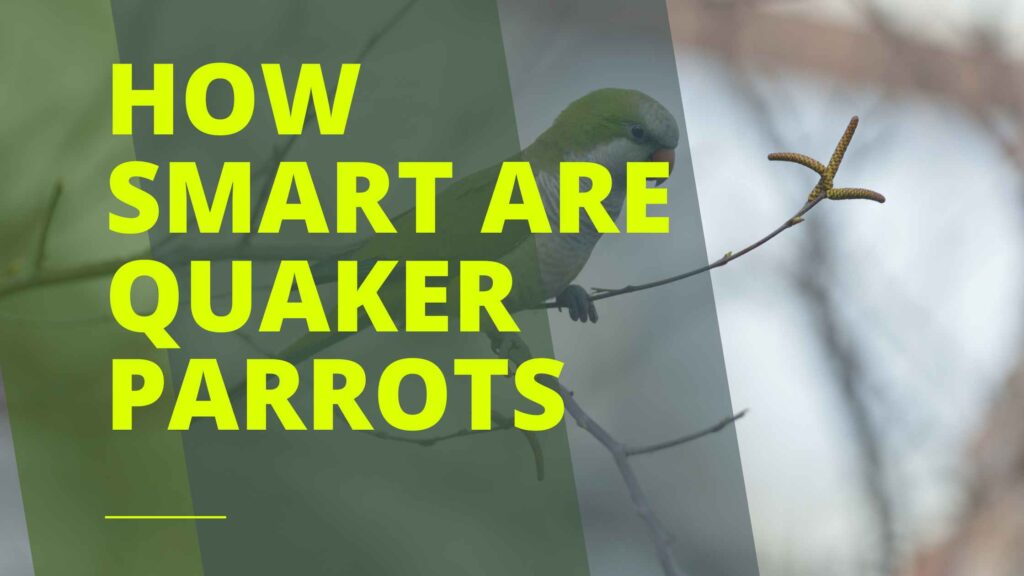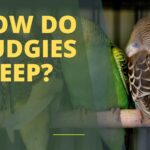Quaker parrots are highly intelligent and capable of complex problem-solving. These bright birds excel in learning and mimicking speech.
Quaker parrots, also known as Monk parakeets, are one of the more intelligent bird species, often compared to children in terms of their problem-solving abilities and social nature. They are known for their exceptional ability to mimic human speech, making them popular among bird enthusiasts.
How Smart are Quaker Parrots? Their smart character enables them to learn a variety of tricks and commands, and they thrive on mental stimulation. Owners often provide puzzles and interactive toys to keep their Quaker parrots engaged.
This intellect, coupled with their social inclination, means they require plenty of interaction and enrichment to stay happy and healthy. It’s no wonder these personable parrots have soared in popularity as pets; they not only bring a chatterbox charm into homes but also offer companionship akin to that of a feathery little friend brimming with brains.

Credit: facts.net
Quaker Parrots: A Brief Introduction
Quaker Parrots, also known as Monk Parakeets, are small, bright-green birds with a splash of grey on their chest and forehead. This species stands out with its remarkable intelligence and the ability to mimic human speech, making it a delightful companion for bird lovers.
Origins And Characteristics
Quaker Parrots hail from South America. These birds love warm climates but have adapted to colder regions too. Known for their hardiness, Quakers can withstand various environments. Here’s a glimpse of what makes them special:
- Social Nature: They thrive in groups and create strong bonds.
- Build Skills: Unique among parrots, they construct elaborate stick nests.
- Talkative: Their ability to mimic human language is impressive.
- Size: They grow up to 29 cm (11 inches) in length.
- Lifespan: With proper care, they can live up to 30 years.
Popularity As Pets
Quaker Parrots rank high among pet owners. Their charming personalities and conversation skills are irresistible. Here’s why they’re so loved:
- Affectionate companions that bond deeply with their owners.
- Energetic and entertaining, they’re sure to bring laughter to any home.
- Intelligent, with a knack for learning tricks and understanding simple commands.
- Maintenance suits all levels of bird-keeping experience.
Measuring Intelligence In Birds
When we talk about bird intelligence, parrots often fly to the forefront. Quaker parrots, also known as Monk Parakeets, stand out with their exceptional abilities. These birds are not just about colorful feathers and charming chatter; they exhibit smarts that can rival larger animals. Grasping the intelligence of birds requires special measures. Let’s delve into how scientists gauge the intellectual prowess of these feathered thinkers.
Cognitive Tests For Avian Species
Scientists have designed tests to measure bird brainpower. These include:
- Mirror test: To see if a bird can recognize itself.
- Shape recognition: Birds discern shapes to probe problem-solving skills.
- String-pulling: This evaluates understanding of cause and effect.
- Shell game: Quaker Parrots show memory strength by finding hidden items.
Quaker Parrots often ace these tasks, showing remarkable cognitive skills that surprise many.
Challenges In Assessing Bird Iq
Determining a bird’s IQ comes with hurdles:
- Each species may require tailored tests that consider unique behaviors.
- Emotional states can influence performance, just like in humans.
- Tests must be repeatedly validated to ensure reliability.
In the case of Quaker Parrots, their adaptability can skew results, showing they are smarter than we thought.
The Brain Of A Quaker Parrot
Quaker parrots, or monk parakeets, are popular pets known for their wit. They catch on to tricks and mimic speech swiftly. Their brains, although small, are powerhouses of intelligence. Let’s unwrap the mystery behind their smartness.
Neurological Makeup
Quaker parrots boast a complex brain structure. Beneath their green feathers lies the key to their smarts. Neurons are packed tightly in their brains. They have many brain cells just like larger parrots.
- High neuron density: More neurons mean better processing power.
- Enlarged forebrain: This is vital for problem-solving skills.
Comparison With Other Birds
Compared to other birds, quakers are brainy. Their ability to learn and remember is fascinating.
| Bird Type | Neuron Count | Cognitive Abilities |
|---|---|---|
| Quaker Parrot | High | Excellent mimic, quick learner |
| Pigeon | Lower | Good at navigation |
| Crow | High | Tool use, problem-solving |
Quakers match up to crows in intelligence. They outshine in vocal mimicry compared to pigeons.
Communication Skills
Quaker parrots, also known as monk parakeets, stand out in the avian world for their remarkable communication abilities. These birds are not only social but also possess an impressive knack for vocalization. From complex sounds to clear mimicking of human speech, Quaker parrots exhibit intelligence that is sure to fascinate both pet owners and bird enthusiasts alike.
Complex Vocalizations
Quaker parrots are known for their wide range of vocalizations. These sounds are often used to express emotions or to interact with their flock. Studies show that these vocalizations can include:
- Calls to signal alert or rallying
- Variations in pitch and frequency to convey different messages
- Chatter sounds during social interactions
It’s believed that Quaker parrots have a complex social structure and their vocal patterns reflect this.
Ability To Mimic Human Speech
One of the most astonishing traits of Quaker parrots is their capacity to mimic human language. Here’s how they fare:
| Age | Speech Ability |
|---|---|
| Young Parrots | Easier to train, more adaptable |
| Older Parrots | Can learn but may take more time |
Not only can they learn words, but they can also form short phrases and use them in context, showcasing their high intelligence and memory skills.
Furthermore, Quaker parrots are apt at using the phrases they learn at appropriate times, indicating a level of understanding that goes beyond simple repetition. For example, they might say “good morning” when the sun comes up or “bye-bye” when someone is leaving.
Problem-solving Prowess
Quaker parrots, also known as monk parakeets, showcase a remarkable ability to solve problems. Their problem-solving prowess often leaves pet owners and researchers amazed. These clever birds are not just a bundle of feathers; they have brains that are adept at navigating challenges that many pets would find baffling. Let’s dive into the anecdotes and findings that underline the intellectual capabilities of these feathered problem-solvers.
Anecdotes Of Ingenuity
Owners of Quaker parrots often share stories demonstrating the birds’ cunning. One such tale involves a Quaker parrot that learned to operate simple mechanisms to escape its cage. Another account describes a Quaker who, after watching its owner struggle with a package, picked up a tool and attempted to assist. Such anecdotes not only amuse but also highlight the Quakers’ readiness to tackle obstacles.
- Cage Escapes: Numerous Quaker parrots have figured out how to unlock their cages.
- Tool Use: These parrots have been observed using objects to reach their goals.
- Collaborative Efforts: Quakers are known to work together to solve problems or achieve tasks.
Structured Experiments And Findings
Scientific experiments confirm Quaker parrots’ problem-solving skills. In controlled settings, these birds have impressed researchers with their ability to understand complex tasks and find solutions. They have solved puzzles that require multiple steps and have used trial-and-error to overcome new challenges.
| Experiment | Task | Finding |
|---|---|---|
| Color Discrimination | Selecting objects by color | Quakers quickly learned to choose the correct color. |
| Object Retrieval | Using tools to retrieve items | Quakers showed proficiency with tools to get rewards. |
| Step-by-Step Puzzles | Solving puzzles with sequential steps | They effectively navigated puzzles, demonstrating sequential reasoning. |
These birds have not only performed well individually but also in groups, suggesting a high level of social intelligence. Quaker parrots’ abilities to observe, learn, and apply knowledge authenticate their status as feathered intellectuals of the avian world.
Social Smarts And Emotional Intelligence
Quaker parrots have fascinating social skills and emotional intelligence. They navigate complex social landscapes with ease. Understanding their interactions sheds light on their intelligence.
Hierarchy And Social Structure
Quaker parrots exhibit a clear social hierarchy. This structure allows them to live in harmony. It shows their ability to adapt and work together.
- Leaders are often the most vocal and active.
- Subordinate parrots show respect by following cues.
- Clear roles help reduce conflicts within groups.
Emotional Bonds And Empathy
Emotional intelligence shines in Quaker parrots. They form deep bonds and can show empathy. These connections highlight their emotional smarts.
| Emotional Trait | Behavior |
|---|---|
| Attachment | Birds pair up, showing affection to partners. |
| Support | They comfort each other in times of stress. |
| Mimicry | Copy sounds to share in group communication. |
In summary, Quaker parrots display sophisticated social smarts and emotional intelligence, which are key to their survival and flourishing communities.
Training And Learning Abilities
Quaker parrots, also known as Monk Parakeets, are renowned for their exceptional learning abilities. These small parrots display a high degree of intelligence and trainability. Owners frequently laud them for their capacity to learn tricks and vocabulary. This section delves into their trainability and learning prowess.
Trainability Scale
The trainability of Quaker parrots can be assessed on a simple scale, comparing them with other popular pet birds. Here’s a glance:
| Bird Species | Trainability Score (1-10) |
|---|---|
| Budgerigar | 5 |
| Cockatiel | 6 |
| Quaker Parrot | 8 |
| African Grey | 7 |
As seen, Quaker parrots often receive a high score of 8. This mirrors their ease of training in comparison to their aviary counterparts.
Case Studies Of Trained Quaker Parrots
- “Milo’s Mimicry Mastery”: A study showcasing a Quaker parrot named Milo, who learned over 100 words and phrases, underlining the species’ remarkable memory and vocal learning capabilities.
- “Puzzle-Solving Polly”: Polly, another talented Quaker, drew attention by solving complex puzzles designed for avian intelligence tests, suggesting an innate problem-solving skill set.
- “Tricks with Tiki”: Documenting Tiki’s journey, the Quaker who mastered a variety of tricks, including playing dead and fetching, indicating their ability to understand and follow complex commands.
These case studies exemplify the high degree of learnability Quaker parrots possess. Owners and researchers witness these traits through varied training exercises and cognitive tests.

Credit: facts.net
Environmental Adaptability
Quaker parrots, known for their striking green plumage and ability to mimic human speech, are not just smart; they are incredibly adaptable to their environments. Let’s explore how these intelligent birds survive in the wild and adjust to life in captivity.
Survival Strategies In The Wild
In their natural habitats, Quaker parrots must be cunning survivors. They display remarkable adaptations that enable them to thrive.
- Building complex nests: These birds construct elaborate, multi-chambered nests, providing safety from predators.
- Foraging skills: They have a diverse diet and can find food in various environments.
- Social living: Quakers live in large groups, which helps in lookout duties and food sourcing.
Adjusting To Life In Captivity
Adapting to life in captivity, Quaker parrots continue to impress with their resilience and flexibility.
- Learning new foods: They quickly transition to new diets provided by their caretakers.
- Embracing toys and puzzles: Quakers enjoy mental stimulation and solve puzzles with ease.
- Building bonds: They form strong attachments with humans, demonstrating social adaptability.
As pets, these birds often mirror the routines and behaviors of their human families, showcasing their ability to adapt from the wild to a loving home.
Conservation Status And Legal Considerations
The Quaker Parrot is a smart, social bird known for its remarkable ability to mimic human speech. Their status and the laws surrounding their existence are crucial for their future. This section details how we can protect these intelligent creatures.
Threats To Natural Habitats
Quaker Parrots face challenges in their natural habitats. Urban expansion and farming practices destroy their homes. They need trees to build complex nests. Here’s a look at their struggle:
- Deforestation: Trees are cut down for lumber and to make way for buildings.
- Agriculture: Farming takes over land, leaving little space for Quaker habitats.
- Climate Change: Alters the availability of food and nesting sites for these birds.
Legality Of Breeding And Ownership
Owning a Quaker Parrot comes with legal responsibilities. Different places have varied rules:
| Location | Status |
|---|---|
| Some U.S. States | Ownership illegal due to potential environmental impact. |
| Other Regions | Ownership with strict breeding regulations. |
Research your local laws and acquire Quaker Parrots responsibly.
:strip_icc()/monk-parakeet-in-barcelona-1283029076-245274da359546a6a9a726bdb23a2064.jpg)
Credit: www.thesprucepets.com
Conclusion: The Intelligence Of Quaker Parrots
Quaker parrots boast a remarkable level of intelligence. This bright green, sociable bird demonstrates cognitive abilities that are quite impressive. As we wrap up our exploration of Quaker parrots, let’s revisit the highlights of their smarts.
Recap Of Cognitive Abilities
Quaker parrots are quick learners. Their cognitive skills include:
- Problem-solving: They figure out puzzles and unlock cages.
- Mimicry: They copy sounds and human speech.
- Memory: Quakers remember commands and locations.
- Social intelligence: These birds cooperate and learn from each other.
The depth of their intelligence rivals that of larger parrots. Such abilities not only entertain but also require mental stimulation.
Implications For Potential Owners
Thinking of getting a Quaker parrot? Here’s what their smarts mean for you:
- Interactive play: They thrive on play that challenges their brain.
- Training: Teach them tricks and commands for a happy life.
- Companionship: They need attention and social interaction daily.
- Environment: Provide a stimulating environment to prevent boredom.
Potential owners must commit time and creativity. Remember, a stimulated Quaker is a joyous Quaker!
Conclusion
Quaker parrots truly showcase remarkable intelligence. Their ability to mimic speech and respond to training is impressive. These sociable birds thrive on interaction and mental stimulation. Consider a Quaker parrot for an engaging and clever feathered friend. Their smarts will surely astound and delight any bird enthusiast.
Ryan Everhart is a passionate bird enthusiast and blogger, primarily writing on his website, Avian Whispers. His journey into the world of bird blogging began with a deep interest in parrots, a species that captivated his attention for their intelligence and social behavior. Over time, his content expanded to cover a broader range of bird species, offering insights into bird behavior, care, habitats, and conservation.
Ryan is dedicated to educating his audience, which includes both new bird owners and seasoned enthusiasts. His writing is filled with personal experiences, expert knowledge, and practical advice on bird care. Through Avian Whispers, he aims to foster a deeper appreciation for birds, emphasizing their role in nature and the joys of having them as pets.
Starting with articles focused on parrots, Ryan’s work now encompasses a diverse range of topics such as feeding, training, habitat enrichment, and bird health. His love for birds extends beyond parrots, diving into various avian species. His informative and heartfelt writing reflects his commitment to the well-being of birds and the desire to help others connect with these creatures.
As a growing voice in the bird blogging community, Ryan strives to provide a platform where bird lovers can learn, share experiences, and connect over a shared passion for avian life. His blogs are not only educational but also serve as a reminder of the importance of protecting and nurturing the bond between humans and birds.




